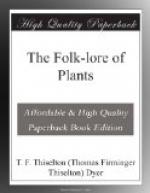The hound’s-tongue (cynoglossum) has been reputed to have the magical property of preventing dogs barking at a person, if laid beneath the feet; and Gerarde says that wild goats or deer, “when they be wounded with arrows, do shake them out by eating of this plant, and heal their wounds.” Bacon in his “Natural History” alludes to another curious idea connected with goats, and says, “There are some tears of trees, which are combed from the beards of goats; for when the goats bite and crop them, especially in the morning, the dew being on, the tear cometh forth, and hangeth upon their beards; of this sort is some kind of laudanum.” The columbine was once known as Herba leonis, from a belief that it was the lion’s favourite plant, and it is said that when bears were half-starved by hybernating—having remained for days without food—they were suddenly restored by eating the arum. There is a curious tradition in Piedmont, that if a hare be sprinkled with the juice of henbane, all the hares in the neighbourhood will run away as if scared by some invisible power.
Gerarde also alludes to an old belief that cats, “Are much delighted with catmint, for the smell of it is so pleasant unto them, that they rub themselves upon it, and swallow or tumble in it, and also feed on the branches very greedily.” And according to an old proverb they have a liking for the plant maram:—
“If you set it, the cats will eat
it;
If you sow it, the cats won’t
know it.”
Equally fond, too, are cats of valerian, being said to dig up the roots and gnaw them to pieces, an allusion to which occurs in Topsell’s “Four-footed Beasts” (1658-81):—“The root of the herb valerian (commonly called Phu) is very like to the eye of a cat, and wheresoever it groweth, if cats come thereunto they instantly dig it up for the love thereof, as I myself have seen in mine own garden, for it smelleth moreover like a cat.”
Then there is the moonwort, famous for drawing the nails out of horses’ shoes, and hence known by the rustic name of “unshoe the horse;” while the mouse-ear was credited with preventing the horses being hurt when shod.
We have already alluded to the superstitions relating to birds and plants, but may mention another relating to the celandine. One of the well-known names of this plant is swallow-wort, so termed, says Gerarde, not, “because it first springeth at the coming in of the swallows, or dieth when they go away, for it may be found all the year, but because some hold opinion that with this herbe the darns restore eyesight to their young ones, when their eye be put out.” Coles strengthens the evidence in favour of this odd notion by adding: “It is known to such as have skill of nature, what wonderful care she hath of the smallest creatures, giving to them a knowledge of medicine to help themselves, if haply diseases annoy them. The swallow cureth her dim eyes with celandine; the wesell knoweth well the virtue of herb-grace; the dove the verven; the dogge dischargeth his mawe with a kind of grasse,” &c.




